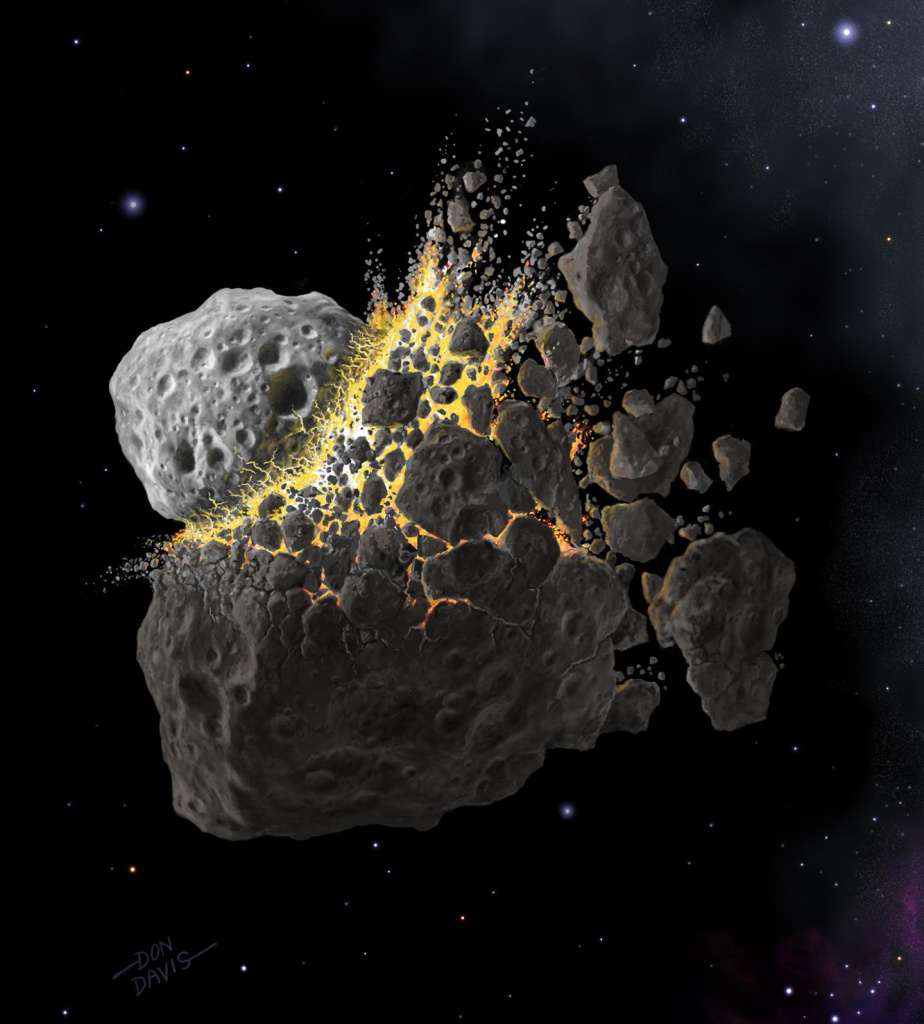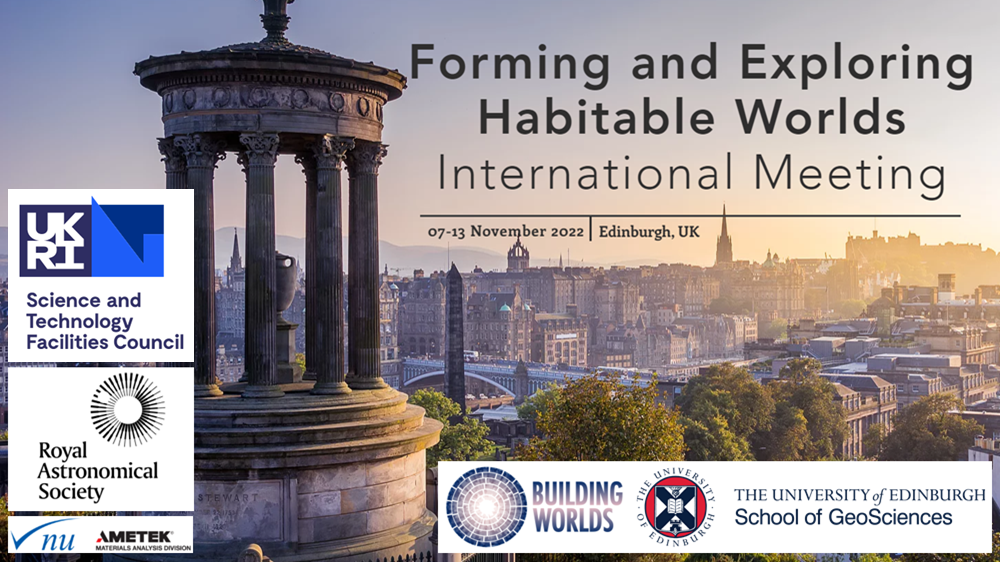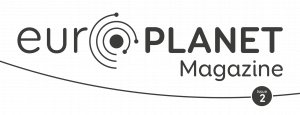Designs on Pandemic and Post-Pandemic Meetings:
Learning with the EPSC 2021 Team
Amy Riches (University of Edinburgh, UK, and SETI Institute, USA) describes her experiences as a planetary geochemist diving into the EPSC2021 Media Internship Programme.
Read article in the fully formatted PDF of the Europlanet Magazine.

Crucial to science is sharing with others and, as with all we do, it is important to work together. The ‘hat’ I usually wear is that of a petrologist and geochemist, deciphering the history of our Solar System embedded in slices of rocks. Via microscopes and various mass spectrometry approaches, I tease out rocky stories over a span of around 4.6 billion years. Included amongst my chemical tools of choice are the ‘highly siderophile element’ group (ruthenium, rhodium, palladium, rhenium, osmium, iridium, platinum, and gold) and related isotopic tracers.1,2
There is much to learn in life, and diving into science-writing for public audiences has proved a thrilling challenge. It was a great privilege to be part of the Media Team for the virtual Europlanet Science Congress (EPSC) 2021. I had a lot of fun with a group of talented people as we reported on new results and eagerly immersed ourselves in as much of the meeting as possible (we still have catch-up access to recordings until September 2022 – what a treat)!3
My role involved liaising with scientists and writing press releases concerning a meteorite-dropping fireball over Slovenia and ‘exotic’ fragments of the Moon recovered by China’s Chang’e-5 sample return mission (pages 8-10). As well as helping to propel exciting science into international news, I pitched in to support the Social Media Team with a bit of tweeting under the #EPSC2021 tag. It was a great experience that I learnt a lot from, while making new professional friends and balancing other commitments. I can certainly recommend giving this type of activity and training a try.
Together in a Changed World
The Covid-19 pandemic has been a difficult time with sad losses of life across the world. This has changed the ways in which we work and prompted deep reflection concerning how societies operate, support and include one another, and how we can adapt and progress with the times.4,5,6 Emerging evidence (e.g. among scientific publishers) shows that the Covid-19 crisis has exacerbated long-standing inequities among scientific communities.7 This emphasises the urgency required in deconstructing cultural and systemic barriers faced by scientists of under-represented groups. As Co-Chair of the European Association of Geochemistry’s Diversity, Equity, and Inclusion Committee, the understanding I have gained from interacting with the Europlanet Society’s Early Career Network (EPEC) and Diversity Committee during EPSC (pages 17-18) will feed into our own activities and assist reciprocal exchanges in future.8 International conferences such as EPSC have long brought scientists together and been prominent in our calendars. Given the excitement that communities feel as work is prepared for these events, the shift to fully virtual meetings has sparked a range of responses, necessitated flexibility among organising teams, and prompted changes not only in how and from where talks are given, but in the ways that we network.
Stream and Beam at Home
In remotely attending this year’s EPSC, not only did I learn a great deal from all the speakers, but so too did my cat and – all be it briefly – the occasional mail delivery person. It was a thrill to instantly ‘find the room’ and have time to attend every keynote lecture! Of course, fully virtual meetings cannot solve persisting needs for childcare provisions and other support of people’s needs during conferences, nor do they offer in-person networking that many of us have long been familiar with. But at EPSC, I found the chat function during live presentations, the virtual community events and the Slack channels to be effective forums for exchange, and potentially a little less intimidating for some people. In particular, members of scientific communities who have caring responsibilities or mental health/neurological differences that pose barriers to attending in-person meetings have reported benefits in accessing and enjoying virtual conferences, and these factors aid the tackling of ableism. 9,10,11
Opportunities Benefitting all our Futures
As we emerge into a changing world, mindful of our duty of care for the safety and welfare of others, scientific conferences will never be the same. It has been valuable to learn through the various virtual practices and experiences of the recent EPSC2021, the 52nd Lunar and Planetary Science Conference, and the Goldschmidt 2021 Virtual Conference. If travel and recovery from jet-lag had been required, I would certainly not have had time, or have been choosing responsibly in attending/presenting work at all three of these 2021 international events, supplemented by presentations at smaller gatherings too. These experiences have been especially informative in the run-up to the inaugural Forming and Exploring Habitable Worlds meeting, taking place in hybrid format in Edinburgh from 7-13 November 2022, which I will Chair with support from its Scientific Steering Committee and sponsors.12 This event in Edinburgh, which offers bursaries, will facilitate a range of useful discussions while providing for opportunities beneficial across career stages, including planned publishing projects.

With conference formats reformed, it remains as important as ever for cooperative communities to unite in exchanging new findings, testable ideas, and sharing best practices that will accelerate scientific progress. As the opportunities of the recent EPSC taught me a great deal, I am eager to engage with the science of the Europlanet community and others again soon, and as part of the approaching meeting in Edinburgh!
Follow @PlanetaryAmy on Twitter.
- Riches (Ed.). 2017. https://bit.ly/3ETGEFc
- https://bit.ly/UKCosmoChem AnalysisNetwork
- https://bit.ly/EuroplanetInternships
- Riches et al. 2021. https://osf.io/d6z72
- Pourret et al. 2021. https://doi.org/10.1016/j.gca.2021.05.054
- European Commission. 2020. https://bit.ly/ECRecoveryPlanEurope
- Myers et al. 2020. https://doi.org/10.1038/s41562-020-0921-y
- https://www.eag.eu.com/about/dei/
- Pourret. 2020. https://doi.org/10.1038/d41586-020-02043-8
- Lawrence. 2021. DOI: https://doi.org/10.1038/d41586-021-02325-9
- Brown and Leigh. 2020. DOI: https://doi.org/10.14324/111.9781787354975
- https://www.habitableworlds.co.uk/


